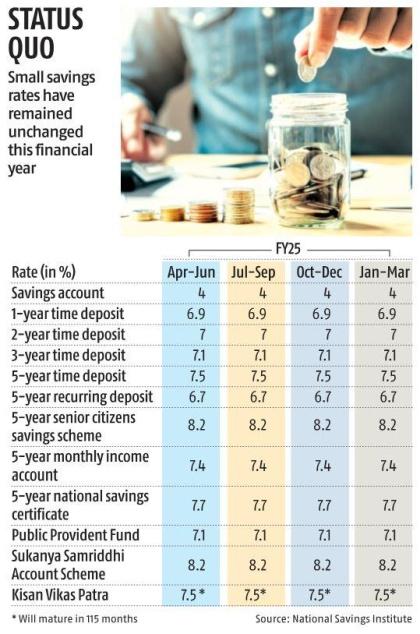The interest rate on these schemes have remained unchanged for over a year now.

In a bid to boost consumption following the repo rate cut by the Reserve Bank of India, the Union ministry of finance may consider bringing down the rates for small savings schemes in the next financial year, government sources indicated.
In its first monetary policy review this year, the central bank on February 7 reduced the repo rate by 25 basis points to 6.25 per cent from 6.5 per cent.
Small savings schemes include Public Provident Fund, Sukanya Samriddhi Yojana, Monthly Income Account Scheme, Kisan Vikas Patra, National Savings Certificate, Senior Citizen Savings Scheme, five-year recurring deposits, among others. The interest rate on these schemes have remained unchanged for over a year now.
The rates for small savings schemes are expected to come for review in the April-June quarter of the next financial year, sources said.
A reduction in the rates of savings schemes is expected to encourage account holders to spend money, fueling demand and consumption in the economy, and thereby private sector investments.
This, experts say, is in line with the consumption push given by Finance Minister Nirmala Sitharaman in the FY26 Budget as well through the reduction in tax rates.
In a major overhaul of the new tax regime in the Union Budget, the FM introduced a zero-income tax slab for taxpayers earning up to Rs 12 lakh annually under the new tax regime.

Relaxing cash management guidelines
Official sources also said the finance ministry may consider relaxing cash management guidelines in March for ministries on a case-by-case basis.
The Centre's cash management guidelines stipulate that ministries should not exceed 33 per cent and 15 per cent of their Budget targets in expenditure in the fourth quarter and the last month of a given financial year, respectively.
"We are encouraging ministries to undertake most of the expenditure by February itself. If there are specific cases where they have not been able to spend, we can allow expenditure above the 15 per cent limit on a case-by-case basis," an official source said.
Due to the general elections and the Budget being presented in July, many ministries and departments were lagging in fully utilising expenditure for the current financial year.
In September 2024, the Department of Economic Affairs had relaxed stipulations applicable to big releases of Rs 500 crore or more for all items of expenditure in order to provide the requisite operational flexibility to execute the Budget.
Feature Presentation: Rajesh Alva/Rediff.com












 © 2025
© 2025